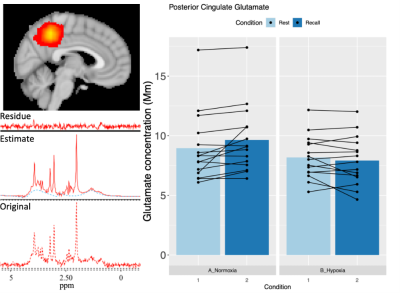Matthew Rogan1,2,3, Joseph B R Smith1,2,3, Alexander Friend3,4, Jamie H Macdonald3,4, Sam J Oliver3,4, Gabriella M K Rossetti5, Mark Mikkelsen6,7, Richard A E Edden6,7, and Paul G Mullins1,2,3
1School of Psychology, Bangor University, Bangor, United Kingdom, 2The Bangor Imaging Unit, Bangor University, Bangor, United Kingdom, 3The Extremes Research Group, Bangor University, Bangor, United Kingdom, 4School of Sport Health and Exercise Sciences, Bangor University, Bangor, United Kingdom, 5Centre for Integrative Neuroscience and Neurodynamics, University of Reading, Reading, United Kingdom, 6Russell H. Morgan Department of Radiology and Radiological Science, The Johns Hopkins University School of Medicine, Baltimore, MD, United States, 7F. M. Kirby Research Center for Functional Brain Imaging, Kennedy Krieger Institute, Baltimore, MD, United States
1School of Psychology, Bangor University, Bangor, United Kingdom, 2The Bangor Imaging Unit, Bangor University, Bangor, United Kingdom, 3The Extremes Research Group, Bangor University, Bangor, United Kingdom, 4School of Sport Health and Exercise Sciences, Bangor University, Bangor, United Kingdom, 5Centre for Integrative Neuroscience and Neurodynamics, University of Reading, Reading, United Kingdom, 6Russell H. Morgan Department of Radiology and Radiological Science, The Johns Hopkins University School of Medicine, Baltimore, MD, United States, 7F. M. Kirby Research Center for Functional Brain Imaging, Kennedy Krieger Institute, Baltimore, MD, United States
Exposure to environmental hypoxia resulted in a loss of the task induced increase in glutamate within the posterior cingulate cortex (PCC) and reduction in glucose concentration. This suggests hypoxia disrupts PCC oxidative metabolism.

Figure 1. Mean voxel location across participants and conditions (top left). Example spectrum (bottom left). Graph representing glutamate ANOVA results. Bars represent the group mean for within condition rest (light blue) to recall (dark blue). Individual connected dots and lines represent within participant rest to recall change (right).
